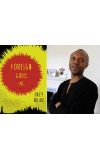
29 Jan 2014 01:51:15
The gods in Okey Ndibe's second novel, Foreign Gods Inc. are playthings for the rich and the famous. They undergo the indignity of being stolen or exiled and then bought and sold like common articles of trade. Even Nietzsche, for whom gods were disposal beings, would have been scandalised by the idea of gods-turned-commodity. He would have felt a bit queasy at the thought of high-end "god shops" in bustling American cities where Hollywood stars and "titans of the corporate world" paid $400,000 for a deity without flinching. Foreign Gods Inc. is a thrilling account of divinity in the age of global capital. The novel recounts Ike's ill-conceived plan to steal Ngene – the patron god of his village. He hopes to sell the deity to a New York City businessman dealing in gods sourced from Africa, Asia, and the Americas. Ike discovers Mark Gruels' strange world of god collecting in a magazine. Gruels' Foreign Gods Incorporated is "the world's oldest god shop." At first, the idea of buying "deities torn away from their shrines in remote corners of the world" fills Ike with disgust. But the crushing weight of piling credit card debt and a gambling problem transforms disgust into fascination. Soon after we meet him, Ike is on a flight bound for his home town in Nigeria to raid his uncle's shrine. In a world where life is increasingly exposed to the tyranny of an exploitative financial order, people are forced to seek out ever more "creative" ways of getting by. For Ike, it is stealing and selling a deity.
With matters pertaining to gods, the stakes are always high. Back at home in the small town of Utonki, Ike finds that he is not the only one who has designs on Ngene. Pastor Uka, the fire-breathing demagogue of an upstart Pentecostal church, is on a mission to destroy the deity. The objectives of both men may appear different, but they share a desire to subject the deity to some form of violence – Ike to uproot it from its native environment, Pastor Uka to put an end to its allegedly demonic influence on the lives of the people.But as Ndibe shows with such dazzling intelligence, the desire to destroy gods is as old as time. In fact, to be a god is to live in a perpetual state of war against other gods, their self-appointed emissaries, and against the forces of history. Nested within the main narrative thread of Foreign Gods Inc. is another story that recalls a time, perhaps a century before. In the uncertain days of colonial expansion, Ngene fought the Christian God, suited in all its colonial illusions of grandeur, and won. This story within a story is also the account of the cocky and temperamental Mr Stanton – a trailblazing missionary – who arrives in Utonki set on a war path to undo the powers of Ngene. Thankfully, Stanton is nothing like the gracious and reasonable Mr Brown in Chinua Achebe's Things Fall Apart. Ndibe spices up the colonial-encounter motif by giving us Mr Stanton – a depressive with serious anger issues and a slight case of mental instability.
I found myself returning to Stanton's story, utterly captivated. Written in italics, it takes up only 27 pages of the entire 332. But it leaves a lingering taste that affects the reader's sense of things as the story progresses. It's as if the entire novel moves in the ghostly shadows of that brief digression. Stanton's story also interrupts the novel's narrative flow with a lyricism that suspends its largely realist composition. Ndibe's writing is at its most alluring when he chronicles Stanton's descent into madness and the somewhat magical decomposition of his physical body, the stench of which Stanton himself is unable to stand.
Foreign Gods Inc. will remind you of Achebe's work. Ndibe borrows the culture-contact motif that structures Achebe's trilogy. References to gods, missionaries, shrines, and high priests evoke the now familiar language often used to tell the story of colonial encounters, popularised by Achebe. But the differences between the two authors are far more significant. In reading Ndibe's novel, it occurred to me that Achebe's trilogy is really three different ways of telling the same story of an African modernity founded on the carcass of vanquished gods. While Ndibe's story is not necessarily one of triumph, it is about survival. He is asking: in what form do these gods – and the worlds they once animated – survive? How have they continued to haunt Africa's contemporary moment and insist on addressing and being addressed by the future?
It's already obvious that 2014 is going to be a big year for African novels. The first quarter alone will see the publication of several highly anticipated works: Adhiambo Owuor's Dust, Helen Oyeyemi's Boy, Snow, Birds, Chris Abani's Secret History of Las Vegas, and Teju Cole's Everyday for the Thief. So it will be a crowded market, but Okey Ndibe is bound to set himself apart from the pack. Who doesn't want to read a novel about a good god heist?

